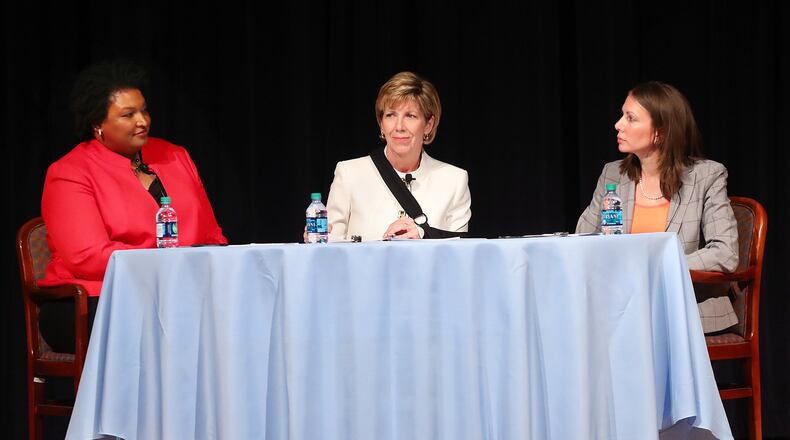Georgia’s two leading Democratic candidates for governor called for stiff new gun restrictions after the deadliest mass shooting in modern U.S. history during a forum Monday that pitted the two rivals on the same stage for the first time.
Stacey Abrams, the former Democratic leader of the Georgia House, slammed the “political cowardice” of lawmakers she said were too timid to challenge the Second Amendment. And former state Rep. Stacey Evans said she would fight to close loopholes she said allow dangerous people to buy weapons.
The stances may seem like typical responses from left-leaning hopefuls for higher office, but they mark something of a sea change for Democratic candidates for governor in Georgia. Though national Democrats have long advocated for sweeping new gun control measures, their Peach State counterparts have been more reluctant to echo their pledges.
Roy Barnes, the state's last Democratic governor, earned the National Rifle Association's endorsement during his 1998 and 2002 runs. Jason Carter, the party's 2014 candidate, held an "A" rating with the NRA and voted for a measure that vastly expanded where Georgia permit holders can carry their weapons.
Abrams and Evans voted three years ago against that measure — dubbed by critics the “guns everywhere” bill — and both took aim at the new gun law signed by Gov. Nathan Deal this year that allows permit holders to carry concealed weapons on parts of public college campuses.
Both also said on social media or at the forum that more stringent requirements to get firearms licenses are needed to prevent massacres such as the one that unfolded late Sunday in Las Vegas when a lone gunman armed with high-powered weapons opened fire on the crowd at a music festival.
“The first responsibility is to acknowledge that we have a problem,” Abrams said at the forum, sponsored by Georgia’s Win List, a political action committee dedicated to electing Democratic women. “And unfortunately there have been too many acts of political cowardice in the wake of gun violence.”
Evans, who called the Las Vegas attack an “act of domestic terrorism,” said she would push to roll back recent Georgia gun rights expansions.
“We need to take action to have good, common-sense gun laws,” Evans said. “We need to take a look at guns everywhere and roll that back. We don’t need guns in our churches or all the public places where it allows.”
A divided race
Though they struck a similar note on gun legislation, the two present Democrats with the most competitive primary in more than a decade. And both have starkly different strategies to win back the state’s top office for the first time since 2002, when Barnes was upset by Republican Sonny Perdue.
In her bid to become the nation’s first black female governor, Abrams is running as an unabashed liberal and pinning her hopes on an alliance of liberal white Democrats and African-American voters. She aims to turn out hundreds of thousands of voters, many of them minorities, who rarely cast ballots.
Evans, meanwhile, has honed an education-themed message focused on the HOPE scholarship to try to keep liberals in the fold while appealing to more moderate voters. This tack has failed her party in the past four statewide elections, but it helped a generation of Georgia Democrats before them.
And both hope that Republicans repelled by President Donald Trump — and turned off by whoever emerges from the crowded GOP field — give Democrats another look in 2018.
The race between the two women, both high-achieving Democrats with striking similarities, started on a divisive note: Evans was shouted down from the stage at a liberal conference in Atlanta this summer by Abrams supporters chanting "support black women."
Since then, the two candidates have rarely attacked each other directly on the campaign trail, mindful of worries that a divisive race could rip apart the party’s tenuous alliance of a growing bloc of black voters and a dwindling number of whites.
At Monday’s event, Abrams brought up the demonstration at the Netroots Conference — she called it the “donkey in the room” — about halfway through the discussion. She said she would never silence her rival, but she would also not condemn a protest that she said gives voice to the voiceless.
“Protest is disruptive. It’s uncomfortable,” Abrams said. “But for communities who have been silenced it’s sometimes the only way they can be heard.”
Firing back, Evans said she didn’t consider the demonstration to be a peaceful protest.
“If something like that happened to my opponent … I would’ve stood up to say that’s wrong because it was wrong,” she said.
In another testy exchange, Abrams asserted that she was the only candidate on stage who didn't vote to "privatize public education" because of Evans' votes for a failing schools initiative and initial support of a tax credit known as a student scholarship organization.
“I’ve never voted to privatize schools, I’ve never voted for vouchers — and I never will. I believe in the power of public education,” she said to a burst of applause.
Between those flash points, though, the two Democrats agreed on other broad policy initiatives, including pledges to bolster the state’s infrastructure system, expand Georgia’s Medicaid program and compromise with Republicans when needed. And both talked about energizing a party in need of a new jolt.
Evans said she’ll aim to be the candidate who leaves a legacy of making Georgia a better place for families.
“There’s so much more that unites us than divides us,” she said. “You don’t win a voter by saying I’m targeting you. Candidates, visionaries talk about issues.”
And Abrams predicted Georgia would be known as “the state of progress” when she departs office.
“I want to leave after eight years in office bold and ambitious children, a thriving and diverse economy, and an effective and efficient government,” she said.
About the Author
Keep Reading
The Latest
Featured




